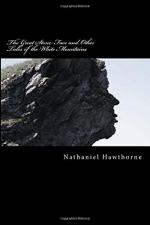I had joined the party, and had a moment’s leisure to examine them before the echo of Ethan’s blast returned from the hill. Not one, but many echoes had caught up the harsh and tuneless sound, untwisted its complicated threads, and found a thousand aerial harmonies in one stern trumpet tone. It was a distinct yet distant and dreamlike symphony of melodious instruments, as if an airy band had been hidden on the hillside and made faint music at the summons. No subsequent trial produced so clear, delicate, and spiritual a concert as the first. A field-piece was then discharged from the top of a neighboring hill, and gave birth to one long reverberation, which ran round the circle of mountains in an unbroken chain of sound and rolled away without a separate echo. After these experiments, the cold atmosphere drove us all into the house, with the keenest appetites for supper.
It did one’s heart good to see the great fires that were kindled in the parlor and bar-room, especially the latter, where the fireplace was built of rough stone, and might have contained the trunk of an old tree for a backlog. A man keeps a comfortable hearth when his own forest is at his very door. In the parlor, when the evening was fairly set in, we held our hands before our eyes to shield them from the ruddy glow, and began a pleasant variety of conversation. The mineralogist and the physician talked about the invigorating qualities of the mountain air, and its excellent effect on Ethan Crawford’s father, an old man of seventy-five, with the unbroken frame of middle life. The two brides and the doctor’s wife held a whispered discussion, which, by their frequent titterings and a blush or two, seemed to have reference to the trials or enjoyments of the matrimonial state. The bridegrooms sat together in a corner, rigidly silent, like Quakers whom the spirit moveth not, being still in the odd predicament of bashfulness towards their own young wives. The Green Mountain squire chose me for his companion, and described the difficulties he had met with half a century ago in travelling from the Connecticut River through the Notch to Conway, now a single day’s journey, though it had cost him eighteen. The Georgians held the album between them, and favored us with the few specimens of its contents which they considered ridiculous enough to be worth hearing. One extract met with deserved applause. It was a ’Sonnet to the Snow on Mount Washington,’ and had been contributed that very afternoon, bearing a signature of great distinction in magazines and annals. The lines were elegant and full of fancy, but too remote from familiar sentiment, and cold as their subject, resembling those curious specimens of crystallized vapor which I observed next day on the mountain top. The poet was understood to be the young gentleman of the gold opera glass, who heard our laudatory remarks with the composure of a veteran.




